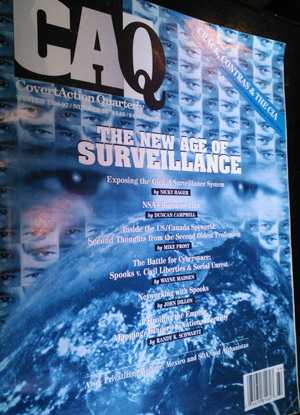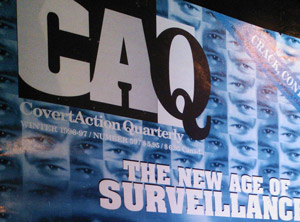
BY CLARISSA-JAN LIM | Recent revelations of the National Security Agency’s surveillance activities have triggered outrage and calls to clamp down on the federal government’s unrestrained Big Brother-like snooping.
Although the government maintains it’s all only being done in the name of national security, many are upset at the extent of the government’s surveillance activities. Following recent revelations by Edward Snowden, Americans are now aware of the PRISM program, which collects communications information from Internet companies in America; the fact that the government collects the metadata of phone conversations; and now, in the latest program to be exposed, XKeyscore, through which a person’s entire Internet history can be accessed by the tap of a computer key.
The N.S.A. surveillance programs aren’t new, said the East Village’s Paul Garrin. The Cooper Union grad was first known for his video art, before he moved on to Internet ventures, such as his encrypted e-mail service, lokmail.com, as well as his domain name registry and Web-hosting company Name.Space, which claims ownership of hundreds of top-level domains, such as, notably, .nyc.
“The Patriot Act, post-9/11, it’s not new,” Garrin said of this country’s culture of keeping tabs on its populace.
Garrin also showed a reporter the winter 1996-97 issue of CovertAction Quarterly, dedicated to the subject of “The New Age of Surveillance.” The publication, now defunct, was founded by former C.I.A. operative-turned C.I.A. critic Philip Agee, and was dedicated to reporting on surveillance activities carried out by governments in different countries.
In short, people have always been watched by their governments, at least “passively,” stated Garrin.
“And then, at any time — this is what Snowden said that didn’t register with people — they can go back [and search a person’s communications history],” Garrin explained. “So it’s not about what you’re doing now, it’s what you’ve done… . Then, whoever is interested can go in and pull up everything.”
Counterterrorism efforts after 9/11 brought about the creation of data fusion centers, with government support, to aggregate data on everybody and everything. A 2007 report by the American Civil Liberties Union, “What’s Wrong With Fusion Centers?”, noted that data fusion is carried out in excessive secrecy and also involves the private sector coughing up information to the feds.
“Basically, the business model is to entice people for free [through communications systems] and get them to spill their guts and share everything,” said Garrin. “It’s exploiting people’s data without due process. It’s the quick extrapolation of data — your friends, your friends’ friends, and so on. That’s a huge scope.”
Garrin also noted that the idea that there is “too much data” is naive, because the more information collected, the easier it is to look for “anomalies.”
“So, anyone who’s going to Al-Qaeda Web sites or looking at Victoria’s Secret, they’re going to see the difference right away,” he said.
Social media Web sites, like Facebook and so on, are what Garrin calls the all-seeing “Digital Panopticon.” The sites profit from not just advertising sales, but by selling users’ information to law enforcement agencies.
The use of social media or data-sharing Web sites is a “Faustian deal,” Garrin asserted, because “access to these services is not free. What you’re giving up is your constitutional rights, and your right to privacy. There’s a greater cost to that than paying a reasonable fee to have your data respected and protected.
“When you’re signing a contract to have access to their facilities for free, you’re basically giving them your copyright, you’re giving them right to use your content in whatever way they see fit,” he said.
Another means of information gathering is through phone-carrier companies that give out their customers’ data. Among Snowden’s many exposés is the collection of metadata — who was called, the duration and time of calls and the location of the parties involved.
Cell phone and landline users also run the risk of having their information bought online, with help from Web sites like whitepages.com or tnid.us that allow people who type in a phone number to find out the name and address of the owner by paying a small fee. Membership allows access to background reports on a phone number’s owner, including such categories as “criminal check, bankruptcies, prior residences and work information.”
The argument that you shouldn’t worry if you have nothing to hide is one that many people make. But simply the availability of one’s information is dangerous, Garrin said.
“It can be used against you and misconstrued and taken out of context in any way that they want,” he explained. Even as remote a connection as having a conversation with somebody five years ago can be considered “guilt by association,” he noted.
The lack of privacy and security in information sharing and communication services on the Internet presented Garrin with a business opportunity to create a consumer choice, something he dubbed the “anti-cloud,” as opposed to “cloud” computer servers, like Google Drive. His “anti-cloud” is still currently in the works.
“The business problem that needs to be solved in the market is to make online networking and communication services convenient — and ensure your liberty,” Garrin stated. “The Internet is great for a lot of things; I’m not saying these other types of trivial interactions [like social media] are not valuable. The question is who has the right to dictate, restrain or put any kind of scrutiny over conversations?”





































